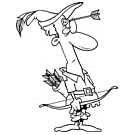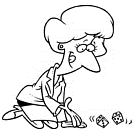

|
|
 |
Don't Try to Win - Roleplaying games aren't about winning and losing.
An adventure is not a competition between the GM and the players. There's no fun in that - the
GM controls the universe and can't lose. It's your job to entertain the players by presenting
challenges for them to overcome, rewarding them when they succeed, and telling a good story along the way.
Don't Abuse Power - Players enjoy a logical, balanced game. Avoid making
arbitrary decisions. You are the interface between the players and a virtual world. It's not
your world, existing simply to show off your creativity as a designer. It is the setting in
which enjoyable stories should take place.
Dice Don't Rule - The dice are not more important than the story. In
general, it's good to follow the rules and rolls, to make a consistent and fair game world. However,
don't let a good or bad roll stand in the way of an entertaining story climax. Characters should die
from bad decisions more often than bad luck.
Don't Favor NPCs - The PCs are more important than any NPCs you create.
Don't try to be a player in your own game through an NPC. Don't put a favorite fictional character
in the game if you can't stand to see the PCs outshine or defeat him.
Have a Framework - Not every adventure needs to be completely fleshed out,
however, you need a framework. The adventure needs to have a purpose, such as finding a lost ruin,
recovering an artifact, meeting an important NPC, defeating a monster, or discovering a vital clue.
Come up with one or more encounters which will lead the PCs toward that goal.
Improvise - You can't plan for everything the players will do. You'll need
to improvise places, objects, and people on a regular basis. Keep a list of common names handy. Try
to draw from personal experience and media sources. Take notes on any major story elements you invent
- it may come up again later.
No Monty Haul - Avoid giving your players wealth and power too quickly. If
something is acquired easily, it isn't cherished treasure. Extremely powerful characters are difficult
to design plots for.
Avoid Grimtooth - Don't abuse traps. When traps are overused, they seem like
arbitrary attempts to kill characters. The story bogs down when the PCs have to check every door and
chest before touching it. Trap placement should be logical. How does the wizard move around in his own tower?
|
|
 |
Starting:
Attributes: 3d6 drop lowest and 2d6
Health Points: Body + Race adj.
Magic Points: Mind + Race adj.
Skill Points: Body in physical, Mind in mental
Traits: 2 human, 1 all other races
Spells: Low magic, Sorcerer Mind/2, Wizard/Bard Mind/3 (round up)
Maneuvers: Warrior Body/3, Ranger/Rogue Body/4 (round down)
Money: Sorcerer/Rogue/Bard 3d6x10cp
Others 3d6 (drop lowest) x10 copper
Attribute Check: 3d6 <= Attr
Skill Check: 3d6 <= Attr + Skill
Saving Throw: 3d6 <= Attr + Adj.
PER Check: 3d6 <= Mind + Skill + PER Adj.
Health Points: Rec 1/8 hr rest & d6/2 first aid
Magic Points: Rec 1/hr rest & 3/hr sleep, base reduced by armor DV
Mv: Body-(Armor DV/2) hexes in combat, (Bodyx5)-Armor DV out
Init: Mind+Body + trait/maneuver, tie to high Body, 2nd tie to high d6
Surprise: -5 initiative on 1st rnd
Att Rank: weapon + spell fx + skill bonus + maneuver + aim - shield use - stun
Def Rank: armor + spell fx + shield + dodge + cover
To Hit: 3d6 <= target # on combat chart
Armor Damage Absorb: Attack missed by 3 or less
Dodge: 3d6 <= Body + Combat skill
Parry: 3d6 <= Weapon AV + Combat skill
2 Weapon Attack: -1 main hand, -3 off hand
Mounted Combat: -1 1H, -2 thrown, -3 ranged, -4 2H
|
|

Site Map
|

